The Mountain West News Bureau has six managing partner stations – Boise State Public Radio, KANW in New Mexico, KUNC in Colorado, KUNR Public Radio in Nevada, Nevada Public Radio, and Wyoming Public Media. Colorado Public Radio in Denver and KJZZ in Phoenix are associate partners and nearly a dozen other stations are affiliate members.
The bureau also produces “Our Living Lands,” a weekly radio segment exploring how climate change affects Indigenous communities, in partnership with Koahnic Broadcast Corp. and Native Public Media.
The Mountain West News Bureau was formed in 2018 and joined NPR’s network of regional newsrooms in 2025. It receives funding from Eric and Wendy Schmidt and the Corporation for Public Broadcasting.
Managing Editor: Michael de Yoanna
Boise State Public Radio Mountain West News Bureau Reporter: Murphy Woodhouse
-
President Trump’s nominee, Steve Pearce, is a former New Mexico congressman and Vietnam War pilot. The opposition feels he could sell off public land.
-
The 11 senators and representatives - all Democrats - said that the consolidation of four Department of Interior agencies’ wildfire programs is being done “without adequate analysis, transparency, or planning to prevent disruption during what is expected to be a significant fire season or to safeguard long-term wildfire preparedness.”
-
Porsche Lane, the pygmy goat, became the focus of a lawsuit over constitutional rights when her owner was told she couldn’t keep the goat at home.
-
The study comes in advance of the upcoming midterms
-
Declining snowpack is creating new challenges for irrigation, livestock, and traditional food systems in tribal communities
-
A coalition of public lands advocates and historians has filed a federal lawsuit against the Trump administration, accusing it of censoring American history and science at national parks, including several in the Mountain West.
-
The 16th annual "Conservation in the West" poll by Colorado College revealed that voters across the political spectrum are concerned by the Trump administration's cuts to public land management.
-
More than a century after the Mountain West’s silver and gold rushes, mercury used to process those metals is still moving through a northern Nevada river system and showing up in local wildlife.
-
Tribes could lease land or sell power — and it might be a way to diversify some tribal economies
-
Health and environmental advocates vow to fight it in court












